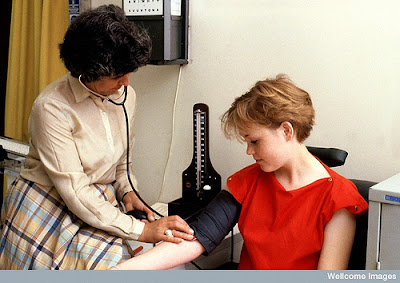High blood pressure is a condition where the blood pressure is more than normal. It is also known as hypertension. Heart pumps out blood, so that oxygen can reach to different parts of the body via blood. The pressure with which heart pumps blood is known as blood pressure. The blood pressure comprises of two measures, the systolic pressure and diastolic pressure. Systolic pressure is the larger figure and represents the pressure within the artery of the heart, when contractions take place which pump blood to different parts of the body. Diastolic pressure is the pressure within the artery of the heart, when the blood is filling in the heart and it is at rest. Both the pressures are measured in millimeters of mercury or mmHg. High blood pressure is abnormal increase in systolic pressure or diastole pressure.
Blood pressure is measured by putting a blood pressure cuff on the arm and placing a stethoscope on the chest. There can be very little variation in blood pressure depending upon the time, emotional moods, age, gender, weight, height, physical activity, stress and other illness such as heart disease and kidney disease. Children and adolescents become anxious when they visit the doctor. This is also an important factor which affects the blood pressure and the readings taken get tampered because of it. That is the reason why many blood pressure readings are taken in order to determine whether the adolescent has high blood pressure or not. The nurse may even ask the adolescent to calm down while taken the readings. Time gap is given between each reading, so as to give time to the adolescent to calm down. Emotions can also affect the blood pressure reading.
An infant will have a normal blood pressure reading of 80/45, where as an adolescent will have a normal blood pressure reading of 110/70. Therefore, age, gender, and height are important factor when determining the normal blood pressure level. Adults will have a higher blood pressure than the infants and teenagers. Also, boys have a higher blood pressure when compared to girls and tall people have a higher blood pressure than short people. An adolescent is said to have high blood pressure when the blood pressure is more than the blood pressure of ninety percent people of his/her age, gender and height.
There are many risks associated with hypertension or high blood pressure. The risk of developing coronary heart disease increases proportionally. The arteries will develop greater resistance towards the blood flow, because of which the heart will pump blood harder. Stroke is also another risk. Adolescents who have had high blood pressure as a child, develop harmful effects on the blood vessels and heart till the time they turn twenty.
The causes of high blood pressure can be classified as primary and secondary. If the causes are definite, they are primary and if the cause is linked to some illness, it is secondary. Primary causes are high blood cholesterol levels, smoking, stagnant lifestyle and overweight. Secondary causes are obesity, immobility due to chronic illness, prescription drugs, intense pain due to burns or cancer and illegal drugs. High blood pressure can develop due to hereditary reasons.
Hypertension is diagnosed by blood test and urinalysis. The kidney function will also be checked, along with blood cholesterol levels. Family history check is another important factor. Adolescents’ eating habits, exercise levels, activities in school and home will also be studied thoroughly. High blood pressure is dealt with by weight reduction, healthy diet, and increase in physical activity. If hypertension is due to illness, the illness is treated first. These treatment measures will decrease the systolic blood pressure and diastolic blood pressure. It will also strengthen the heart and decrease the level of cholesterol in blood. This also helps to keep heart diseases at bay. The good thing is that only one percent of the adolescents, who have high blood pressure, need medication to bring back the blood pressure to normal.

0 comments:
Post a Comment